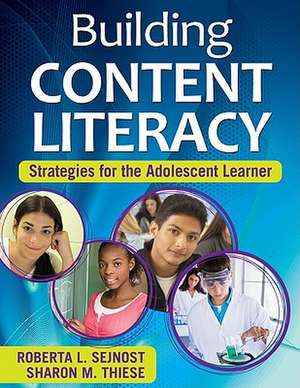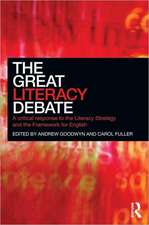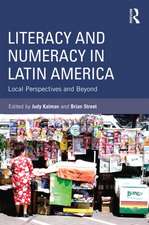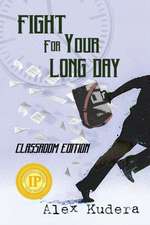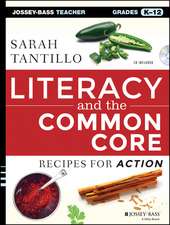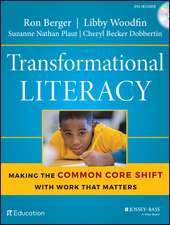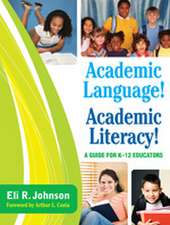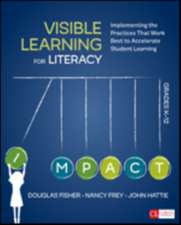Building Content Literacy: Strategies for the Adolescent Learner
Editat de Roberta L. Sejnost, Sharon M. Thieseen Limba Engleză Paperback – 3 mai 2010
- Strategies to foster acquisition of specialized and technical content vocabulary
- Specific processes and skills students may use to comprehend narrative and expository texts
- A variety of writing-to-learn strategies
Speaking-to-learn strategies.
Finally, the authors consider the challenges that face students in the age of technology and address the new literacies that can be utilized to engage students and increase learning.
Preț: 286.47 lei
Nou
Puncte Express: 430
Preț estimativ în valută:
54.82€ • 57.50$ • 45.63£
54.82€ • 57.50$ • 45.63£
Carte tipărită la comandă
Livrare economică 01-15 aprilie
Preluare comenzi: 021 569.72.76
Specificații
ISBN-13: 9781412957151
ISBN-10: 141295715X
Pagini: 176
Dimensiuni: 216 x 279 x 10 mm
Greutate: 0.5 kg
Ediția:1
Editura: SAGE Publications
Colecția Corwin
Locul publicării:Thousand Oaks, United States
ISBN-10: 141295715X
Pagini: 176
Dimensiuni: 216 x 279 x 10 mm
Greutate: 0.5 kg
Ediția:1
Editura: SAGE Publications
Colecția Corwin
Locul publicării:Thousand Oaks, United States
Recenzii
"Secondary teachers will find this book a superb resource to inform the teaching and learning of their students, as it includes many research-based strategies to enhance reading comprehension and written language in every area."
"Sejnost and Thiese address the national literacy crisis by providing a practical guidebook that meets the needs of adolescent learners by focusing on the literacy skills needed for the 21st century. They provide educators with a book that engages the learner and creates independence in content area reading."
"Sejnost and Thiese have read the minds of teachers everywhere and have provided exactly the right book. This resource offers engaging, focused lessons that will meet the needs of a variety of students. The recommended strategies are supported by research and explained clearly, making this book informative and easy to use."
"Very useful and practical for those enrolled in teaching methods courses for secondary English and practitioners interested the latest research on reading, literacy, and writing in the content areas, as well as practical applications and model lessons. It emphasizes how adolescent learners have special needs, whether they are gifted students taking accelerated courses or those with limited skills coming from disadvantaged schools with few resources. By offering examples using multiple modalities for instruction, the book is a very welcome resource, one which I wish I had had years ago as a new high school teacher. It encourages teachers to employ collaborative learning, problem-based learning and other strategies and provides them with many templates."
"This clear and concise text does an excellent job in preparing preservice and practicing teachers to use content area strategies to teach literacy in the disciplines. The chapter on real-world literacy is especially timely and useful. We definitely plan on using this valuable resource to help us better prepare the teachers of tomorrow."
"Sejnost and Thiese provide strategies to help all adolescent students in all content areas be more successful. Based on the authors' extensive expeience and research, readers are shown the importance of developmentally appropriate learning, methods and strategies that are challenging and engaging for adolescent learners, and the motivational value that comes from data-driven feedback."
"Sejnost and Thiese address the national literacy crisis by providing a practical guidebook that meets the needs of adolescent learners by focusing on the literacy skills needed for the 21st century. They provide educators with a book that engages the learner and creates independence in content area reading."
"Sejnost and Thiese have read the minds of teachers everywhere and have provided exactly the right book. This resource offers engaging, focused lessons that will meet the needs of a variety of students. The recommended strategies are supported by research and explained clearly, making this book informative and easy to use."
"Very useful and practical for those enrolled in teaching methods courses for secondary English and practitioners interested the latest research on reading, literacy, and writing in the content areas, as well as practical applications and model lessons. It emphasizes how adolescent learners have special needs, whether they are gifted students taking accelerated courses or those with limited skills coming from disadvantaged schools with few resources. By offering examples using multiple modalities for instruction, the book is a very welcome resource, one which I wish I had had years ago as a new high school teacher. It encourages teachers to employ collaborative learning, problem-based learning and other strategies and provides them with many templates."
"This clear and concise text does an excellent job in preparing preservice and practicing teachers to use content area strategies to teach literacy in the disciplines. The chapter on real-world literacy is especially timely and useful. We definitely plan on using this valuable resource to help us better prepare the teachers of tomorrow."
"Sejnost and Thiese provide strategies to help all adolescent students in all content areas be more successful. Based on the authors' extensive expeience and research, readers are shown the importance of developmentally appropriate learning, methods and strategies that are challenging and engaging for adolescent learners, and the motivational value that comes from data-driven feedback."
Cuprins
Preface
Acknowledgments
About the Authors
1. The Challenge of Adolescent Literacy
What Is the Challenge?
How Can We Meet the Challenge?
Content Area Literacy
Meeting the Standards
The Challenge of Reading Diverse Texts
Reading Narrative Texts
Reading Expository Texts
Scaffolding Instruction for Special Needs Students
Chapter Summary
2. Teaching Specialized and Technical Vocabulary
The Implication of Teaching Vocabulary
Teaching Vocabulary in Content Area Disciplines
Word Categorization Activities
Graphic Representations
The Writing Connection
Chapter Summary
3. Reading to Learn in Content Area Disciplines
Reading in Specific Content Area Disciplines
Scaffolding Reading in Specific Content Areas
Chapter Summary
4. Writing to Learn in Content Area Disciplines
A Rationale for Writing to Learn
Writing-to-Learn Strategies
Chapter Summary
5. Speaking to Learn in Content Area Disciplines
A Rationale for Speaking to Learn
Speaking-to-Learn Strategies
Chapter Summary
6. Fostering Real World Literacy
The Literacies of the Real World
The Internet
Informational Literacy
Inquiry-Based Learning
Information-Gathering and Analysis Activities
Problem-Based Project Learning
Project-Based Learning
Media Literacy
Visual Literacy
Chapter Summary
References
Index
Acknowledgments
About the Authors
1. The Challenge of Adolescent Literacy
What Is the Challenge?
How Can We Meet the Challenge?
Content Area Literacy
Meeting the Standards
The Challenge of Reading Diverse Texts
Reading Narrative Texts
Reading Expository Texts
Scaffolding Instruction for Special Needs Students
Chapter Summary
2. Teaching Specialized and Technical Vocabulary
The Implication of Teaching Vocabulary
Teaching Vocabulary in Content Area Disciplines
Word Categorization Activities
Graphic Representations
The Writing Connection
Chapter Summary
3. Reading to Learn in Content Area Disciplines
Reading in Specific Content Area Disciplines
Scaffolding Reading in Specific Content Areas
Chapter Summary
4. Writing to Learn in Content Area Disciplines
A Rationale for Writing to Learn
Writing-to-Learn Strategies
Chapter Summary
5. Speaking to Learn in Content Area Disciplines
A Rationale for Speaking to Learn
Speaking-to-Learn Strategies
Chapter Summary
6. Fostering Real World Literacy
The Literacies of the Real World
The Internet
Informational Literacy
Inquiry-Based Learning
Information-Gathering and Analysis Activities
Problem-Based Project Learning
Project-Based Learning
Media Literacy
Visual Literacy
Chapter Summary
References
Index
Descriere
This guide presents research-based strategies that enable secondary teachers to increase adolescent learning while meeting standards by incorporating reading, writing, and critical thinking into content instruction.
